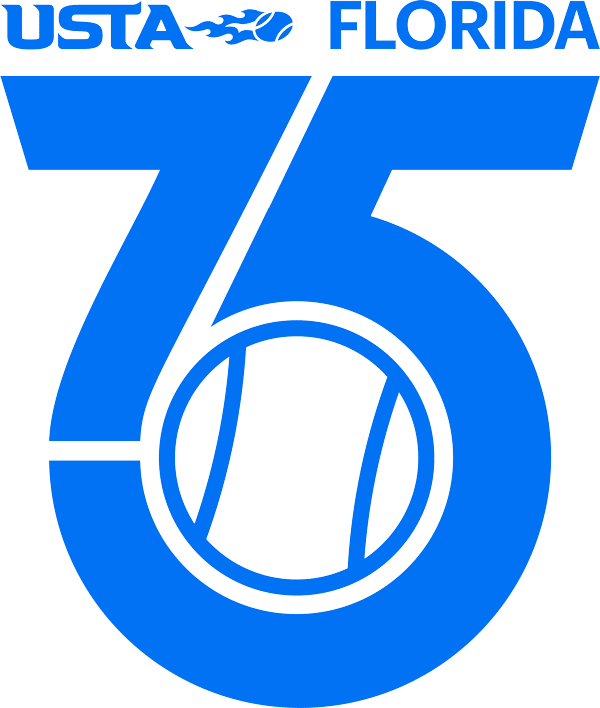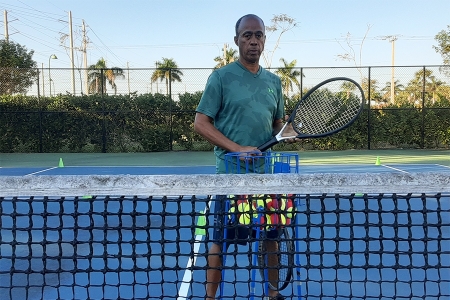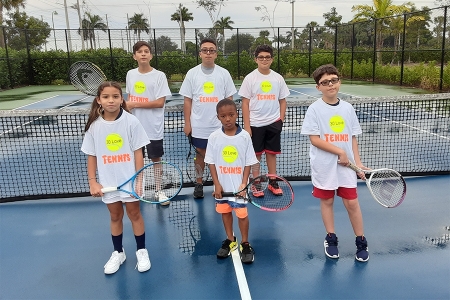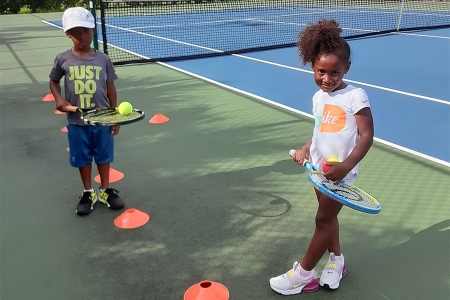In celebration of Black History Month, throughout February USTA Florida recognizes all of those in the Black community whose talents and dedication help to grow the great game of tennis every day — at every level. We applaud them all for making tennis a better and more inclusive sport, and for making the face of our game more accurately reflect the dynamic diversity of our country. As part of our coverage, USTA Florida has provided a platform for community members to be honest and open about their thoughts and experiences.
A community coach at The Point at Wellington, J. Russell Kelly has committed himself to ensuring the game of tennis is accessible to everyone. Born in Brooklyn, raised in the West Bronx and now residing in Royal Palm Beach, Kelly is also a member of USTA Florida’s Leadership Academy.
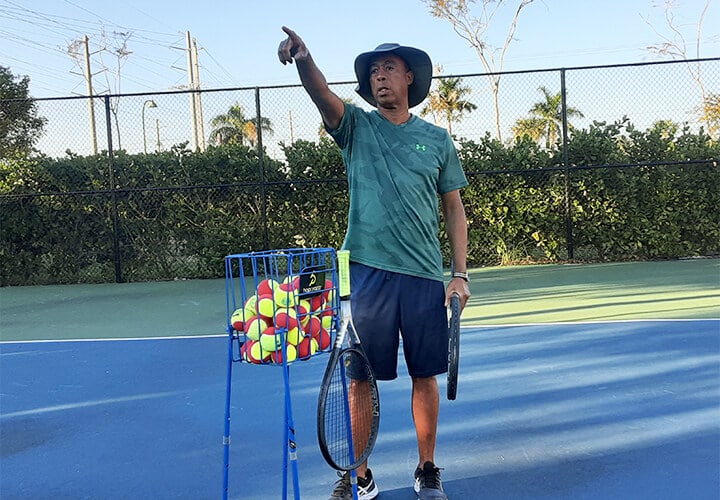
J. Russell Kelly
Tennis is clearly a big part of your life. When did you first pick up a racquet?
I first picked up a racquet while on campus at Dillard University in New Orleans. The on-campus courts were just a few yards away from where I was staying, Camphor Hall. This made it easy for me to get on the court early in the morning before my classes and before the blazing temperatures hit our magnificent oak trees.
What are some highlights that stand out from your tennis career?
After graduating from Dillard in 1980 I moved to Flushing, N.Y., where I was able to walk or take the #7 train one stop to the USTA Billie Jean King National Tennis Center to see matches. The experience of seeing remarkable players like Yannick Noah playing a night match and Martina Navratilova serving so high off the ground was amazing. There is just a vibe there that is unmatched, It is so New York.
I later moved to South Orange, N.J., where I began playing doubles on a regular basis with a small group of friends at the Baird Community Center. Eventually, I met two people who would change my relationship with tennis forever – Ellen Williams, the Tennis Coordinator for Willingboro Recreation and Parks, and Joe Moss, the head teaching professional. Moss coaches with a level of expertise that only a man or woman born with a gift can deliver. Ms. Williams encouraged me to consider coaching Youth Tennis after seeing me on the court with my son Jameison. She was impressed with his understanding of the game at the early age of 4. She put me in touch with Net Generation and this connection gave rise to “Jameison 30 Love Tennis”. I consider both of them my mentors, and we stay in touch.
How do you currently help grow tennis in Florida?
Since 2020, I have been a community coach at The Point at Wellington where I work with players from age 4 to 12. Our goal is simply to introduce the fundamentals of tennis to new players in a fun way while promoting exercise, self-confidence and social skills. Diversity, Equity and Inclusion are important to me and to the parents and guardians of our Jameison 30 Love Tennis Family. We have players of African, Asian, European, South American, Central American and Caribbean heritage. We also have some players who have cognitive challenges and have partnered with Lisa Pugliese-LaCroix and Love Serving Autism to make a difference. We are able to provide adaptive tennis by networking with other more established tennis facilities that use her curriculum or by having clinics on our court.
We work to coach confidence both on and off the tennis court. In education there is something known as Assistive Technology – out on the tennis court, I use Assistive Psychology. I get to know my players by observing their body language and by just genuinely talking to them. If a student enjoys hitting volleys more than serving, I’ll make sure that they spend 20% of their time in a game or drill doing what they enjoy. We are not trying to build top 100 players, instead, we are fostering the feeling and joy that comes from accomplishment, growth and being with friends who respect you 100% of the time for who you are; just as you are.
You attended USTA Florida’s Community Coach Pilot Program in Wellington, what was your experience like?
I was happy to attend the Community Coach Pilot Program at the Wellington Tennis Center. I believe with the pandemic combined with the shortage of trained coaches, returning to the approach of recruiting community coaches is an excellent strategy. The on-court experience was like a virtual think tank and one which could not be replicated online. An artist needs a canvas; a coach needs a court.
I think when leaders such as Chuck Gill, the Director of Tennis at the Wellington Tennis Center and Dustin Forman, USTA Florida Tennis Service Representative, work side by side with a group of coaches from various locations and organizations it speaks to their commitment to growing tennis in the state of Florida.
Have you ever felt less valued in a tennis-related space because of your racial background?
I have never felt less valued in a tennis-related space. A person can not be made to feel less valued unless you give someone else the power to define who you are. I know who I am, so this is not an issue.
There was an occasion in 1997 when I played at a very exclusive country club in New Jersey with a few friends. Someone in the locker room was about to ask me for a towel under the presumption I was a locker room attendant. Fortunately, one of my friends intervened to say that I was with them. This man had been blinded by what he perceived to be the image of wealth and privilege.
My skin is brown. People who look like me ruled as Kings and Queens and established civilizations. We must remember that ‘race’ is a concept. As we learned from the late preeminent scholar Dr. John Henrik Clarke, the concept did not exist before the 1500s. I challenge everyone to stop classifying people by checking boxes. People of all cultures and ethnicities need to understand history.
Has your race ever impacted your career on and off the court?
I believe the implication of race always impacts one’s career. In the early days of my career as a management trainee for a major New York Investment Bank, I didn’t think about racism as an obstacle. I was focused on learning to navigate the corporate landscape. There was pressure to demonstrate excellence and there was a sense that people of all backgrounds were watching me. What was missing was the opportunity to have a mentor, because there was no one in upper management that looked like me. My point is simple, a lack of diversity impacts everyone in an organization, not just one group of candidates or employees.
Twenty years later I worked as an analyst for one of the largest and most successful global financial and insurance companies. It was an environment where you felt that the culture was very international and that you could grow based on your performance. This particular company was founded in Asia in the early 1900s and I wonder if having an eastern philosophical management origination at its core made a difference. Everyone was treated with respect and dignity. No matter job title or ethnic identity, management made sure to celebrate team success.
What do you believe can be done to foster long-term change when it comes to racial inequality in Florida tennis?
I have a not-so-radical approach to fostering racial inequality – inclusive marketing. I think we need to see more images of diverse tennis players on billboards, buses, bus stops, etc. Instead of just inviting people out for play dates, let’s remove the barriers to access by generating daily conversations about tennis. Grow the sport from the inside by meeting people where they are through more images, more events, and more love for the sport.
Technology has to play a role in this marketing effort, so it would help to have free apps for youth to download in order to play online. Education is the goal, the more they learn about tennis, the more likely they are to pick up a racquet.
More specifically, what do you think USTA Florida could do to strengthen its relationship with minority communities?
I think USTA Florida is on the right path when it comes to strengthening its relationship with underserved communities. The efforts can be seen in the USTA Florida Leadership Academy, the Community Coaches Program, Amplify and many other initiatives. Hundreds of board members, committee members, coaches, and volunteers are moving tennis forward with Diversity, Equity and Inclusion (DEI) being one of the central themes. Doing these feature profiles as part of Amplify and the celebration of Black History Month creates goodwill and allows new voices to be heard. On the streets people talk, so good deeds go a long way.
Why is it important to celebrate Black History Month in general, as well as in tennis?
In general, celebrating Black History Month is important because to do so means to honor the lives, efforts, and contributions of our elders not just to America, but across the world. I can’t define what it means for others, but for me, it is a time to think about and discuss those who I have been inspired by – my mother, my older brother Craig, my childhood best friend Stephanie, Langston Hughes, Gordon Parks, Dr. Angela Davis, Sidney Poitier, Dr. Leonard Jeffries, and Dr. John Henrik Clarke. To celebrate one’s history is to preserve it, and I hope we can continue to add the names of those making a difference right now to the list. They too must be acknowledged, for the past, the present and the future are all indeed connected.
Why celebrate Black History Month in tennis? What did people of color do when Jim Crow laws kept them from playing and competing in mainstream society? The same thing that was done in banking, filmmaking, baseball and elsewhere – we created our own system! We must honor the American Tennis Association (ATA) which has been promoting DEI for over 100 years after its founding in 1916. When walls are built to keep people out, entrepreneurs will rise up through collective work and responsibility building safe spaces for those who have been excluded to practice their craft.
Why is it important to not only support and celebrate other cultures, but be inclusive to all?
Inclusivity is something that must begin at home in the way people are raised. It’s important to teach that everyone should be respected, regardless of their cognitive ability, gender identification, economic status, sexual orientation, religious beliefs, native language or nationality.
If you had to share your message of unity, what would it be?
When I think of the call for unity, I turn to my mothers’ words: “the leaves don’t fall far from the trees”. Our legacy lies within the thoughts, beliefs and actions of our children; they are our leaves. We must demand more from ourselves and more from generations to come.
USTA Florida believes tennis is for everyone. For more information about USTA Florida’s Amplify initiative, visit USTAFlorida.com/Amplify.
